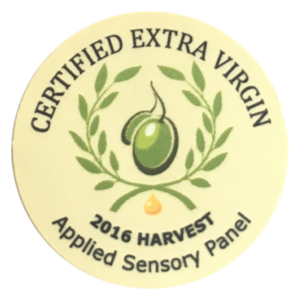Food Fraud in Olive Oil- Buyer Beware
In our tasting room I am frequently asked about fraud in olive oil.
The USP* warns that the amount of food fraud has increased by 60% over the last few years. They state that the most adulterated foods are olive oil, milk, honey, syrups, lemon juice, pomegranate juice, tea, spices, and seafood.
After the 60 Minutes report last year and the book, Extra Virginity, by Tom Muller, customers are asking great questions about the provenance of olive oils. At IL Fiorello, we can point to the specific trees and state that the oil you are tasting comes from our groves. But in general, olive oil fraud is rampant. Why so much fraud? This is a “follow the money” situation. Producers use less extra virgin oil, cut it with vegetable oil, and make more money. The larger quantity of a poor quality bulk olive oil mixed with more flavoring and herbs and spices, the more money you make. Usually the vegetable oil is highly refined by high heat and chemicals. Much of this oil is made by large multinational international conglomerates. Some is made here in the United States.
Extra virgin olive oil can only be made from olives, and nothing else. NOTHING. If you see a bottle of olive oil that says extra virgin on the label and then contains herbs, that is fraud here in California. Extra virgin oil must pass both a master taste test and a chemistry test and must have a specific label on the bottle stating that that oil has passed certification. If the oil says organic it must also have a certification label for organic. So oils that say organic extra virgin basil oil and are neither extra virgin nor organic. These standards are set by California, modeled after some of the high standards set by Australia. The problem is that there are not enough olive oil police to identify the companies that are making fraudulent oils, and therefore duping the customers.

We go to great lengths to certify our oils as extra virgin. We happily discuss both the master taste panel and the chemistry tests of our oils. We are certified organic and put the organic label on our organic oils. We can point to the trees that grow the olives for our oil. Our mill is certified organic.
At IL Fiorello we also make co-milled olive oils made with superior quality olives and superior quality fresh fruit: lemons, limes, mandarins, and jalapenos. Both are milled together and the result is co-milled olive oil. We believe that co-milling delivers better quality and depth of flavor. This oil cannot be labeled extra virgin oil as it contains something other than olives. Even though the olives we use could make extra virgin oil, we cannot label it as such. Some companies say “made with extra virgin olive oil” because they added flavoring to extra virgin oil, but that is walking a fine line within the law.
This is a buyer beware situation, or as I like to call it- buyer BE aware. Be aware of your purchases, know your purveyor. Be smart, extra virgin olive oil is expensive, delicious, and should be used when fresh. Check the labeling for the harvest date, then you know when the oil was made. The “best by” date is irrelevant.
We invite you to come talk with us about the fraud in olive oil. The discussion will enlighten you, and hopefully help you make better decisions about your food choices.
Ciao,
Ann
*The U.S. Pharmacopeial Convention (USP) is a scientific nonprofit organization that sets standards for the identity, strength, quality, and purity of medicines, food ingredients, and dietary supplements manufactured, distributed and consumed worldwide. USP’s drug standards are enforceable in the United States by the Food and Drug Administration, and these standards are used in more than 140 countries.
Since its founding in 1820, USP has helped secure the quality of the American drug supply. Building on that legacy, USP today works with scientists, practitioners, and regulators of many nations to develop and revise standards that help protect public health worldwide. WWW.USP.ORG

